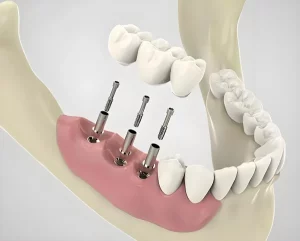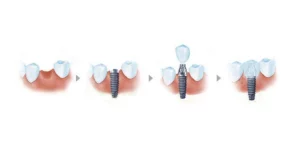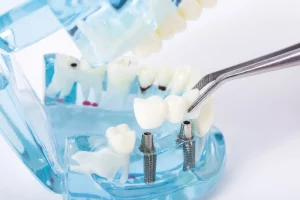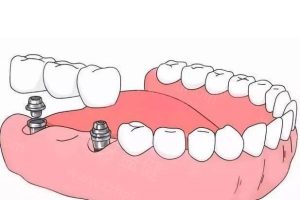One of the most cutting-edge methods for restoring lost teeth is dental implants. They restore both function and appearance and provide a long-lasting, natural-looking substitute for conventional dentures or bridges. To guarantee the greatest result, dental implant surgery necessitates adequate preparation, just like any other surgical treatment. To assist you comprehend the procedure, reduce risks, and guarantee a speedy recovery, we will walk you through the crucial procedures to be ready for dental implant surgery in this post.

Understanding Dental Implants
Dental implants: What Are They?
Dental implants are biocompatible, often titanium, prosthetic tooth roots that are surgically inserted into the mandible. The look and functionality of your original teeth may be restored by attaching a crown, bridge, or denture once the implant and bone fuse (a process known as osseointegration). Three parts make up the implant system:
- The titanium screw that is inserted into the mandible is called an implant post.
- Abutment: A connection that secures the crown or prosthesis and rests above the implant post.
- The visible tooth replacement that is affixed to the abutment is called a crown or restoration.
Why Opt for Dental Implants?
Compared to other tooth replacement methods like dentures or bridges, dental implants provide the following advantages:
- Durability: Implants may last a lifetime if properly maintained.
- Natural Feel and Look: By simulating the look and feel of real teeth, implants enhance confidence, comfort, and communication.
- Preventing Bone Loss: By stimulating the jawbone, implants help stop the bone loss that may happen when teeth fall out.
Initial Consultation and Pre-Surgery Assessment
Selecting a Skilled Implant Expert
Selecting the best implant expert is the first step in your dental implant journey. Speaking with a dentist or oral surgeon who has a lot of expertise with dental implants is crucial. Seek for a specialist with a history of successful surgeries and board certification. You may also make sure you’re in good hands by reading reviews and requesting before-and-after pictures of prior patients.
Pre-operative Assessment
Following your selection of an implant expert, you will have a comprehensive assessment that usually consists of:
- The dentist may evaluate the condition of your jawbone, gums, and neighboring teeth with the use of X-rays or CT scans.
- Review of Medical History: Any pre-existing medical issues (such as diabetes or heart disease) should be discussed since they may have an impact on the implant’s success or recovery.
- Gum and Bone Health: Your bone density to sustain the implant will be assessed by the expert. Other operations, like as gum treatments or bone grafting, can be required in some situations before moving forward.
Assessing Your Application
People who are typically healthy and have enough jaw bone mass to sustain the implant become the best candidates for dental implants. However, prior to surgery, certain issues, such gum disease or inadequate bone, may need to be treated. Your implant expert will provide tailored advice according to your particular requirements.
Pre-Surgery Preparations
Observe your dentist’s advice.
Following all of your dentist’s or oral surgeon’s recommendations is essential to getting the greatest results. This might consist of:
- Give Up Smoking: Smoking raises the chance of implant failure and may hinder recovery.
- Dietary Recommendations: You could be told to stay away from items that might affect your recuperation or operation.
Guidelines for Medication
You could be given prescription drugs to take before to surgery, depending on your medical history. Typical pre-operative guidelines consist of:
- Antibiotics: To lower the chance of becoming sick.
- Painkillers: Before surgery, your dentist could suggest over-the-counter pain medication.
- Thinners of Blood: In order to lower the possibility of significant bleeding during surgery, your dentist could advise you to temporarily cease taking any blood thinners.
Make Plans for Assistance After Surgery
You will need a driver to take you home after surgery and to remain with you for a few hours, particularly if you are under general anesthesia or sedation. Make plans for a friend or relative to help you.
Preparing for the Day of Surgery
Hydration and Fasting
Before the procedure, you will be told to fast for a certain period of time if you are receiving sedation or general anesthetic. This implies that you should abstain from food and liquids for at least six to eight hours before the treatment. This may not be required, however, if you’re simply getting local anesthetic; be sure by seeing your dentist.
What to Bring On the day of your surgery, bring:
- Identification: Your insurance details and a legitimate ID.
- List of Medication: a list of all the drugs you are taking at the moment.
- Comfortable Clothes: Since you could be laying down for a long time, dress comfortably and loosely.
Mental Readiness
Anxiety before surgery is common, but tension may be lessened with mental preparation. Think about methods of relaxation including meditation, deep breathing, or listening to calming music. Keep in mind that you are in excellent hands with your implant expert, who is a qualified professional.
Understanding the Surgery Process
Anesthesia Types
When doing dental implant surgery, three primary forms of anesthetic are utilized:
- Only the vicinity of the implant site is numb by local anesthesia.
- Sedation: For people who are nervous, sedation might make you feel calm and sleepy during the process.
- For more complicated instances or for those who would rather be totally unconscious throughout the procedure, general anesthesia is used.
Methodical Process
The actual operation is usually simple and may be divided into the following steps:
- Incision: To reveal the jawbone, the dentist makes a tiny incision in the gum tissue.
- Implant Positioning: The implant post is inserted into the mandible with precision.
- Healing: After the gums shut, the implant starts to osseointegrate, or fuse with the bone, over the course of the next several months.
- Abutment and Crown: Following the implant’s integration with the bone, a bespoke crown is positioned on top of the abutment.
Pain Control
Because of the anesthetic utilized, the majority of patients have very little discomfort after the treatment. Typically, over-the-counter painkillers or prescription drugs from your dentist are used to treat post-surgery discomfort.
Post-Surgery Care and Recovery
Quick Aftercare Guidelines
To guarantee appropriate recovery after surgery, adhere to these guidelines:
- Rest: For the first several days, stay away from physically demanding activities.
- Ice: During the first 48 hours, use ice to minimize swelling.
- Pain relief: When necessary, use the recommended painkillers.
Handling Pain and Swelling
Following dental implant surgery, some edema and pain are typical. These usually go away in three to five days. Ask your dentist for guidance if the discomfort or swelling doesn’t go away.
Nutrition and Dental Health
Limit your diet to soft foods like yogurt, smoothies, and soups for the first several days. Steer clear of chewing on the implant’s placement side. To maintain the site clean, rinse with saltwater after brushing your teeth, being careful around the implant region.
Appointments for Follow-Up
Follow-up appointments are necessary to track the healing process and make sure the implant is correctly integrating into the bone. Your dentist will also examine the gums and the general condition of the implant site during these appointments.
Risks and Complications
Despite its overall safety, dental implants include certain dangers, such as infection, implant failure, or nerve injury. You may reduce these dangers by carefully following your dentist’s advice.
- Warning Signs of Severe Pain or Bleeding: significant or ongoing discomfort beyond the first period of healing.
- Fever or pus: Infection-related symptoms that need to be treated right once.
- Implant Movement: Get in touch with your dentist immediately if the implant feels loose.
Final Thoughts and Tips for Success
Your quality of life may be greatly enhanced by dental implant surgery, which restores both function and appearance. You may contribute to a successful and seamless operation by taking the right precautions before the procedure.
The Key Is Patience
Keep in mind that dental implant surgery is a lengthy procedure. It may take many months for the implant to fully integrate into the bone, and it can take longer to make and install the final crown. For optimal results, exercise patience and adhere to your dentist’s care guidelines.
Remain upbeat
You can go through the healing process with a positive outlook. Your dental implant will be a long-lasting solution that improves your smile and your quality of life if it is prepared for and maintained properly.





